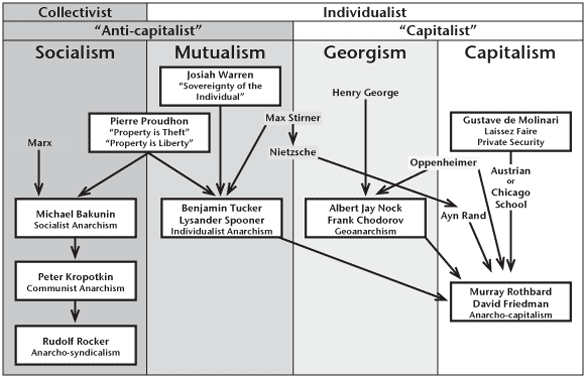Types of Anarchism
There are many ways one could classify the various schools of anarchism. One could look at transitional plans, preferred types of association or community, or even target audience. However, the most important and contentious issue in modern anarchism is economics. In particular justice in property and justice in trade. The following table shows how two simple questions about property can categorize the bulk of anarchist thought.
|
Categories of Anarchism |
Should cost be the limit of price?
(Is profit wrong/exploitative?)
|
||||
|
Individualist anarchism | Anarcho-capitalism | |||
| Libertarian socialism | Geoanarchism | ||||
Shortly after, the German philosopher Max Stirner presented his rational egoist philosophy in "The Ego and Its Own" (1844) also translated as "The Individual and His Property." Stirner was semi-anarchist - he denied the legitimacy of the State (and rights, and gods, and even morality), but he did not oppose the existence of the State or seek to abolish it. Nevertheless, his egoism and individualism was extremely influential to later anarchists, particularly individualist anarchists and (via Ayn Rand) anarcho-capitalists.
The socialist anarchists took Proudhon's critique of property as their main theme. Michael Bakunin soon became the movement leader, with a collectivist turn from Proudhon's private possession mutualism. Bakunin's socialist anarchism (called generally "libertarian socialism") developed into several sub-branches, depending on the vision for change. Kropotkin's anarcho-communism borders on primitivism in its notion of local collective life; Anarcho-syndicalism sees industrial workers as the key players, and simultaneous "general" strikes as a major weapon.
The individualist anarchists took Proudhon's individualism to heart, with its private property, but also Proudhon's exploitation theory - the labor theory of value. Mutualists are basically capitalists who think making a profit (from rent, labor, or interest) is wrong. They support the right to profit - they would not use force against a profiteer - but they consider it a vice and only possible due to government monopoly or privilege. Individualist anarchists generally either take a natural rights position or rely on Stirnerite egoism.
Just as mutualism predates Proudhon, Georgism predates Henry George. For those who hold this position, land (and all natural resources) are not man-made, so they cannot be owned. The theory that labor creates ownership and land is "commons" goes back to Locke, and was supported by Adam Smith, Tom Paine, Thomas Jefferson and many others. The Georgist idea is that people should pay rent to the community for land they use. When Georgism met with Oppenheimer's anti-statist sociology, the result was Geoanarchism.
The whole logic of laissez-faire capitalism leads to anarchism, and the same can be said for liberalism. As Thoreau eloquently wrote:
"I heartily accept the motto, 'That government is best which governs least;' and I should like to see it acted up to more rapidly and systematically. Carried out, it finally amounts to this, which I also believe - that government is best which governs not at all."Anarcho-capitalism takes the economics of the Austrian School, the politics of individualist anarchists, the anti-war and anti-socialist agenda of Old Right geoanarchists, and spinkles on objectivist egoism to taste.


Property Systems
Property is a relationship between people regarding a scarce good. Denying the validity of the State, anarchists consider all property as allodial. The following property qualification types address who may hold property and how can it be transferred to a new owner.
Who May Own
- pure property - anyone or any group may own
- community property - the community collectively is permanent non-transferrable owner
- corporate property - only certain collectives or types of collectives may own
- caste property - only certain types of people may own
How Transferred
- contract property - owner retains ownership until he agrees to alienate
- possession property - owner loses ownership upon non-use or abandonment
These are the property types favored by the four anarchist schools:
| Anarchist Schools | Socialist | Mutualist | Geoist | Capitalist |
| Land and natural resources | corporate possession | pure possession | community | pure contract |
| Man-made capital goods | corporate possession | pure contract | pure contract | pure contract |
| Is it moral to collect profit from land, labor, or capital? |
No. It's criminal and should be expropriated. |
No, but it's non-aggressive, so shouldn't be prevented. |
No, for land; Yes, for labor and capital. |
Yes. It's permissable and generally a virtue. |
| Anarchist Schools | Socialist | Mutualist | Geoist | Capitalist |
| Land and natural resources | corporate possession | pure possession | community | pure contract |
| Man-made capital goods | corporate possession | pure contract | pure contract | pure contract |
| Is it moral to collect profit from land, labor, or capital? |
No. It's criminal & should be expropriated. |
No, but
non-aggressive, so shouldn't be prevented. |
No, for land; Yes, for labor and capital. |
Yes. Permissable & generally a virtue. |
